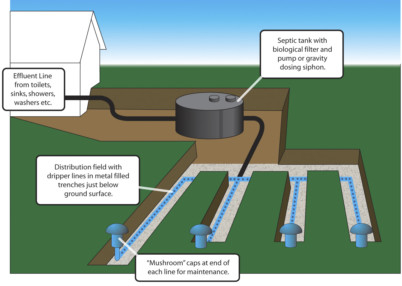
Its climate and scarce rainfall make it difficult for the UAE to sustain potable water production by means other than desalinating seawater. This involves vaporising and re-liquefying seawater in plants powered by natural gas and liquefied natural gas, and sometimes diesel.
About 40 per cent of supply is supported by 70 desalination plants. More than half comes from groundwater sources, but these are mainly used for irrigation as just 3 per cent can be classified as drinkable due to salt water intrusion, according to the UAE Ministry of Environment and Water. Around 9 per cent is treated wastewater.
As there is no other way of supplying potable water, the emphasis is on projects and innovation to save water in industry and at home. Dr Mohammad Mustafa Al Mulla, Director of the Water Resources Department at the UAE Ministry of Environment and Water, is quoted in the UAE – State of the Water Report issued by the ministry as saying: “Treated wastewater is a valuable resource for addressing water scarcity. Thus, treated wastewater has an important role to play in water resources management in the UAE. To date, it has been used primarily for greening of urban areas, but this needs to change.”
The ministry predicts that at current rates the UAE’s total annual water demand will double to 8.8 billion cubic metres by 2030 from 4.4 billion cubic metres in 2008. The greatest increase will be in urban centres, in households, the industrial and commercial sectors and public facilities.
According to the UAE Water Conservation Strategy, desalination and wastewater treatment will have to increase to satisfy growing demand, with the so-called reclaimed water making up a far larger share in the future. Experts say this should go in tandem with strategies to save water. Mohammed Saleh, Director-General of the Federal Electricity and Water Authority, says the UAE has the highest per capita consumption rate in the world at around 550 litres a day, more than three times that of Europe. Al Mulla says this should go down by at least 50 per cent and be kept through to 2050.
GN Focus looks at innovative projects that could help achieve this goal.
Separate cycles
Expensive desalinated water is used for drinking, showering, cleaning and toilet flushes in homes and offices. The solution is two different circulation systems — the conventional for tap water, showering, etc., and another for lower purity requirements such as cleaning. In a project by engineering firm Chris Arm & Associates in Melbourne, wastewater from an office building has been directed to a black water plant in the basement.
After treatment the water is pumped to a holding tank on the roof connected to toilet flushes and water taps for cleaners. Project Manager Marcus Fakhry says: “The building used around 130,000 litres of drinking water for toilet flushing in a single day. Now that it uses recycled water, the use of drinking water has been reduced by 62 per cent.” The project is supported by Australia’s Smart Water Fund.
New Zealand-based Ashby Consulting Engineering has developed on-site wastewater treatment facilities for residential and small communities.
Smart distribution
While the use of treated wastewater has gone up, there are too few distribution channels to use more of it for irrigation, watering golf courses and parks and supplying cooling plants.
According to official figures, up to 40 per cent of treated wastewater can’t be used for these purposes due to lack of pipelines to communities and landscaped areas and is, therefore, dumped into the sea.
The solution would be a smart pipeline network distributing wastewater from central treatment plants, and smaller plants in communities.
Water-efficient technology
A lot of machinery in manufacturing uses water-based lubricants and cooling systems. New technology allows for significant savings — beverage producer Cadbury Schweppes saved more than 21 million litres annually in just one plant by replacing its water-based lubricant conveyor lines with ones that work without water.
Drip irrigation
The greatest wastage of water in the UAE occurs in agriculture. The popular spray irrigation method results in the loss of a third of water through evaporation. New systems such as subsurface drip irrigation can prevent this wastage, as can less water-intensive crops or plants. Such techniques have been deployed by Advanced Hydrotech in Abu Dhabi and Epic Green Solutions in Dubai.
Social media
IBM has launched the WaterWatchers project in Johannesburg to encourage citizens to report water wastage via a smartphone app. The project could work in the UAE too.
Dewa launched the Be Water Smart campaign in September to raise awareness about water use.












